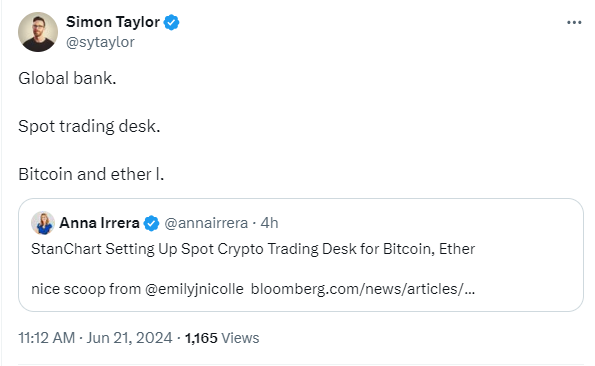Hello everyone and welcome to the latest edition of GreySpark Insights.
Please do not hesitate to contact us with any questions or comments you may have. We are always happy to elaborate on the wider implications of these headlines from our unique capital markets consultative perspective. Happy reading!
💥Top story
📰Newsflash
📈Buyside
A report from Coalition Greenwich has found that over half of buyside firms have cited a lack of coverage from their brokers as their biggest pain point in their equity trading workflow. In this regard, coverage refers to continuity and the tendency of the broker to put its ‘best foot forward.’ With the transition to T+1 settlement in the US now underway, the acceleration of settlement times is seemingly impacting the ability of brokers to attend to its clients needs to the same extent as done before under T+2 settlement. In addition, roughly 47 per cent of firms in the survey cited middle- and back-office settlement issues as another key pain point, which could invariably worsen as the market adapts to T+1 trade settlement.
Asset manager 3iQ eyes launching first Solana ETP in Canada
Digital asset manager 3iQ has filed to list a Solana exchange-traded product (ETP) on the Toronto Stock Exchange. According to a press release this week, a preliminary prospectus for The Solana Fund (QSOL) has been filed with the securities regulatory authorities in Canada. 3iQ noted in an ‘X’ statement that if regulators give the green light, QSOL would be the first ETP tied to Solana and available in North America. Solana is a blockchain and cryptoasset network that is designed to host decentralised and scalable applications. Solana is the fifth largest cryptoasset network by market capitalisation. An exchange traded product listing for Solana would follow in the footsteps of the Bitcoin and Ether exchange-traded fund listings in the US earlier this year, highlighting the increased institutional interest toward cryptoassets.
📉Sellside
Citi invests in commercial lending platform Numerated
Citi has made a strategic investment in AI-powered modular commercial lending platform Numerated. Under the deal, Numerated will provide its AI-based financial spreading solution to 15,000 Citi users across the world. The Numerated platform can process data from diverse private company financial statement formats, including handwritten notes, Excel documents, PDFs and other formats commonly used by business owners, significantly reducing the time required for financial analysis. Machine learning algorithms ensure that the data is accurately captured, normalised and consistently presented. That data can then be used efficiently for various use cases after proper validation by an employee.
Santander Culls WhatsApp From Spanish Investment Bank Phones
Banco Santander SA has removed popular messaging application WhatsApp from its investment banker’s work phones in Spain, underscoring the latest developments in terms of how banks are clamping down on staff communications. The campaign by Santander comes amid a wave of large regulatory fines in the US over the failure by banks to properly monitor employee communications through unauthorised messaging apps and ensure proper surveillance protocols. Regulators say it is significantly harder to investigate wrongdoing when firms fail to save records.
✴️Digital transformation
Cboe and FTSE Russell collaborate to innovate digital asset derivatives
Cboe Global Markets has expanded its collaboration with FTSE Russell to drive product innovation in the digital assets space. The new development builds on an existing relationship between the two firms, using their combined expertise to develop new derivatives products. This could potentially start with cash-settled index options tied to the FTSE Bitcoin Index and the FTSE Ethereum Index. As part of the collaboration, Cboe plans to list cash-settled index options on FTSE’s indices – subject to regulatory approvals – which will target increased investor demand for exchange-traded derivatives to manage crypto exposure in a US-regulated trading environment.
US corporate bond trading automation pegged as key technology priority for 2024
The US corporate bond market saw trading volumes increase by 34 per cent year-on-year, with average daily trade count up by 20 per cent. Meanwhile, average ticket size was down 16 per cent across the same time frame, and investment grade (IG) bid-ask spreads were down 44 per cent. These figures, although largely positive for investors, have resulted in the dealer community being required to become increasingly efficient in their client liquidity provisions. As a result, increased automation of parts of the corporate bond trading process is set to become the main technology priority for capital markets firms this year.
📱Technology trends
Revolut is adding the ability to buy and sell corporate and government bonds for its users across Europe. Offered through Revolut Securities Europe, the service lets users invest in bonds across European Economic Area markets with a minimum amount of €100 or $100 at a fixed fee of 0.25 per cent per trade, pointing to the increased democratisation of the bond market. Revolut is also expanding its trading options through a partnership with CMC Markets. CMC will provide trading, pricing, account systems, execution and clearing, all delivered via the Revolut app. Initially, customers will have access to FX, Index, Commodities, Treasuries and Equity CFDs, with the ability to support other asset classes in the future, according to CMC CEO Peter Cruddas.
The Australian Stock Exchange (ASX) has announced the admission of its first spot Bitcoin exchange-traded fund (ETF), marking a significant milestone in the institutional adoption of cryptoassets in the APAC region. The admission of the VanEck Bitcoin ETF (ASX:VBTC) this week comes as cryptoassets, such as Bitcoin and Ether, increasingly move into the investment mainstream, with the formal approval of their respective exchange-traded funds in the US earlier this year. VBTC will be backed by a Bitcoin holding via a US domiciled master fund, ensuring that each unit of the ETF corresponds to a specific amount of Bitcoin.
🧑⚖️Regulatory developments
HSBC ‘seriously violated’ Swiss money laundering rules, regulator says
HSBC’s Swiss private bank failed to conduct adequate checks on more than $300m (£236m) worth of transactions over the course of 13 years, the country’s banking regulator has found. The Swiss Financial Market Supervisory Authority (FINMA) stated this week that the business had “seriously violated financial market law” over its relationship with two unnamed politically exposed customers. Specifically, FINMA has blocked HSBC Private Bank (Suisse) SA, which deals with higher net-worth clients, from entering into any new business relationships with politically exposed persons until the business conducts a review of all its current high-risk and politically-exposed customers. A spokesperson for HSBC said the bank planned to appeal FINMA’s decision.
Two people arrested on suspicion of running illegal £1bn crypto exchange
UK Police have arrested two people on suspicion of running an illegal crypto exchange that traded more than £1 billion-worth of cryptocurrency. Two people, aged 38 and 44, had their London offices searched by the Financial Conduct Authority (FCA), while the Metropolitan Police seized several digital devices during searches of two residential properties in the capital. More than £1 billion of unregistered cryptoassets are believed to have been bought and sold through the business, the FCA stated. The arrests come at a time where the FCA is taking a tougher stance toward illegal cryptoasset firms. Last year, the FCA introduced new rules for the marketing of cryptoassets, with clear risk warnings about cryptoassets, while ensuring that promotions of their service offerings were fair and not misleading.
📊Chart of the week
As the graphic above shows, banks are playing catch-up in terms of implementing AI tools and technologies, including generative AI. Although AI isn’t really anything new and has been in the capital markets industry for several years, it is the next generation of AI tools such as large language models that expand capabilities beyond traditional use cases to widespread use cases, such as sales, fraud detection, document processing, credit decisioning and pricing that are in question. The extent to which a bank successfully undergoes widespread adoption of AI will be dependent on its status as an AI leader or lagger, which can be defined as the following:
AI leader: Companies with strong technical capabilities, AI talent, and effective leadership and execution are the likely winners. Leading BigTechs, investing heavily in AI, should also predominate in this category. Some fintechs will also join this group, possibly together with a few product and technology-focused banks. A current example is JPMorgan, which is currently at the top of the Evident AI Index, an industry-recognised benchmark for commercial AI adoption and performance in financial services sector. JP Morgan currently employs 11.5 per cent of all ‘existing AI talent’ in the banking industry.
Laggards: Companies that are disadvantaged with debt – technology debt, culture debt and organisational debt are expected to lag behind in AI terms. This may reflect risk averse corporate leadership and/or a tight regulatory environment. Laggards could include some traditional banks that struggle with outdated systems and bureaucratic processes, making it difficult for them to respond to market changes and compete effectively. First Citizens bank, which operates in roughly 23 states in the US, sits bottom of the Evident AI Index. Given that AI could add $170 billion or 9% to Global Banks Sector Profit Pool by 2028, banks likely do not want to find themselves under this bracket.
🐤Tweet of the week
Standard Chartered is establishing a spot trading desk for buying and selling Bitcoin and Ether, the native token of the Ethereum network. The new London-based desk will start operations soon and be part of the bank's FX trading unit. In doing so, Standard Chartered will become one of the first global banks to enter spot cryptocurrency trading, though other banks have been trading crypto derivatives for several years. The move from Standard Chartered to create a spot trading desk for cryptoassets once again highlights the continued integration of this new asset class into the global financial system.
📄GreySpark insight
The 2008 financial crisis accelerated ongoing regulatory initiatives intended to bring more stability, security and protection to capital markets investors through an increase in the EU and in the US, primarily, of trade and transaction reporting. In response to these regulatory reforms, CIBs formed GRC and risk management policies as a third line of defence (3LoD). At the board level, specific rules and controls were created by the C-suite and passed down for translation into risk management controls in the middle- and front-office. However, because of the bespoke nature of the front-office and the organic difficulties that arise from transferring and interpreting internal executive policies into actionable procedures, it proved challenging for institutions to develop a 1LoD comprised of specific practices that could be implemented as an interpretation of mandated risk management controls.
Those regulatory mandates were specifically designed to increase the resiliency of financial markets by enforcing transparency for end-investor decision-making through a focus on:
Risks taken;
Capital deployed;
Prices formed;
Trades and transactions; and
Services provided and their quality.
Discover more here.





